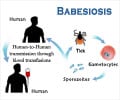
The researchers also observed behavioural change in infected fish, suggesting that parasites may manipulate host behaviour to make them seek out warmer temperatures.
They discovered that whilst parasites grew faster in higher temperatures, the host's growth rate slowed.
"What we witnessed was that fish infected with the largest worms showed a preference for warmer water, suggesting that these parasites also manipulate the behaviour of host fish in ways that benefit the parasites by maximizing their growth rates," Iain Barber, the lead researcher, said.
The scientists found that parasitic worms infecting stickleback fish grew four times faster in experimentally infected sticklebacks raised at 20 degrees than when raised at 15 degrees.
In contrast, the fish grew more slowly at the higher temperature, suggesting that fish parasites cope with higher temperatures much better than the fish they infect.
Advertisement
"After the 8 weeks of the study, all of the worms infecting the fish held at 20C were ready to infect fish-eating birds, whereas none of those held at the lower temperature had reached a size at which they were ready to be transmitted," he added.
Advertisement
Source-ANI














